Network administrators are the backbone of any organization's IT infrastructure. They ensure that all network systems operate smoothly and securely, facilitating effective communication and data management across the organization.
Key skills for a network administrator include proficiency in network configuration, troubleshooting, and security, along with strong analytical and problem-solving abilities.
Candidates can write these abilities in their resumes, but you can’t verify them without on-the-job Network Administrator skill tests.
In this post, we will explore 8 essential Network Administrator skills, 10 secondary skills and how to assess them so you can make informed hiring decisions.
Table of contents
8 fundamental Network Administrator skills and traits
The best skills for Network Administrators include Network Configuration, Troubleshooting, Security Management, IP Addressing, Performance Monitoring, Backup and Recovery, Vendor Management and Documentation.
Let’s dive into the details by examining the 8 essential skills of a Network Administrator.
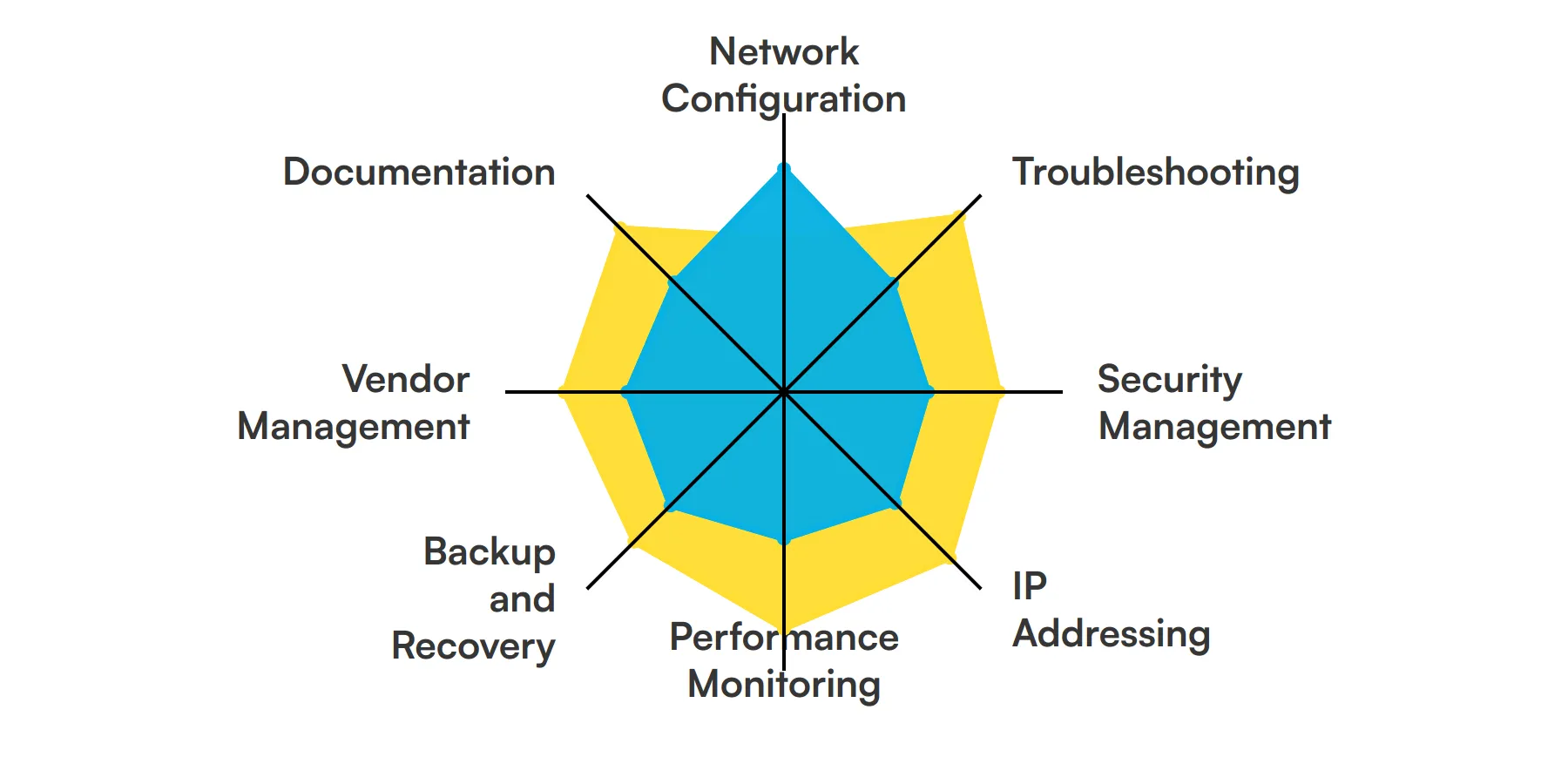
Network Configuration
Network administrators need to set up and configure network hardware and software. This includes routers, switches, firewalls, and VPNs. Proper configuration ensures that the network runs smoothly and securely.
For more insights, check out our guide to writing a Network Administrator Job Description.
Troubleshooting
When network issues arise, the ability to diagnose and resolve problems quickly is crucial. This skill involves identifying the root cause of connectivity issues, hardware failures, or software glitches and implementing effective solutions.
Security Management
Protecting the network from unauthorized access and cyber threats is a key responsibility. This involves setting up firewalls, intrusion detection systems, and implementing security protocols to safeguard sensitive data.
Check out our guide for a comprehensive list of interview questions.
IP Addressing
Understanding and managing IP addresses is fundamental for network administrators. This includes assigning IP addresses, managing subnets, and ensuring proper routing of data packets across the network.
Performance Monitoring
Regularly monitoring network performance helps in identifying bottlenecks and ensuring optimal operation. This involves using tools to track bandwidth usage, latency, and overall network health.
Backup and Recovery
Ensuring data integrity through regular backups and having a recovery plan in place is essential. This skill involves setting up automated backup systems and being prepared to restore data in case of a failure.
Vendor Management
Network administrators often work with various hardware and software vendors. This skill involves negotiating contracts, managing relationships, and ensuring that vendor services meet the organization's needs.
Documentation
Keeping detailed records of network configurations, changes, and procedures is important. Good documentation helps in troubleshooting, training new staff, and maintaining network integrity.
For more insights, check out our guide to writing a Technical Writer Job Description.
10 secondary Network Administrator skills and traits
The best skills for Network Administrators include Scripting, Cloud Services, Virtualization, Wireless Networking, Load Balancing, VoIP, DNS Management, QoS, Compliance and Project Management.
Let’s dive into the details by examining the 10 secondary skills of a Network Administrator.
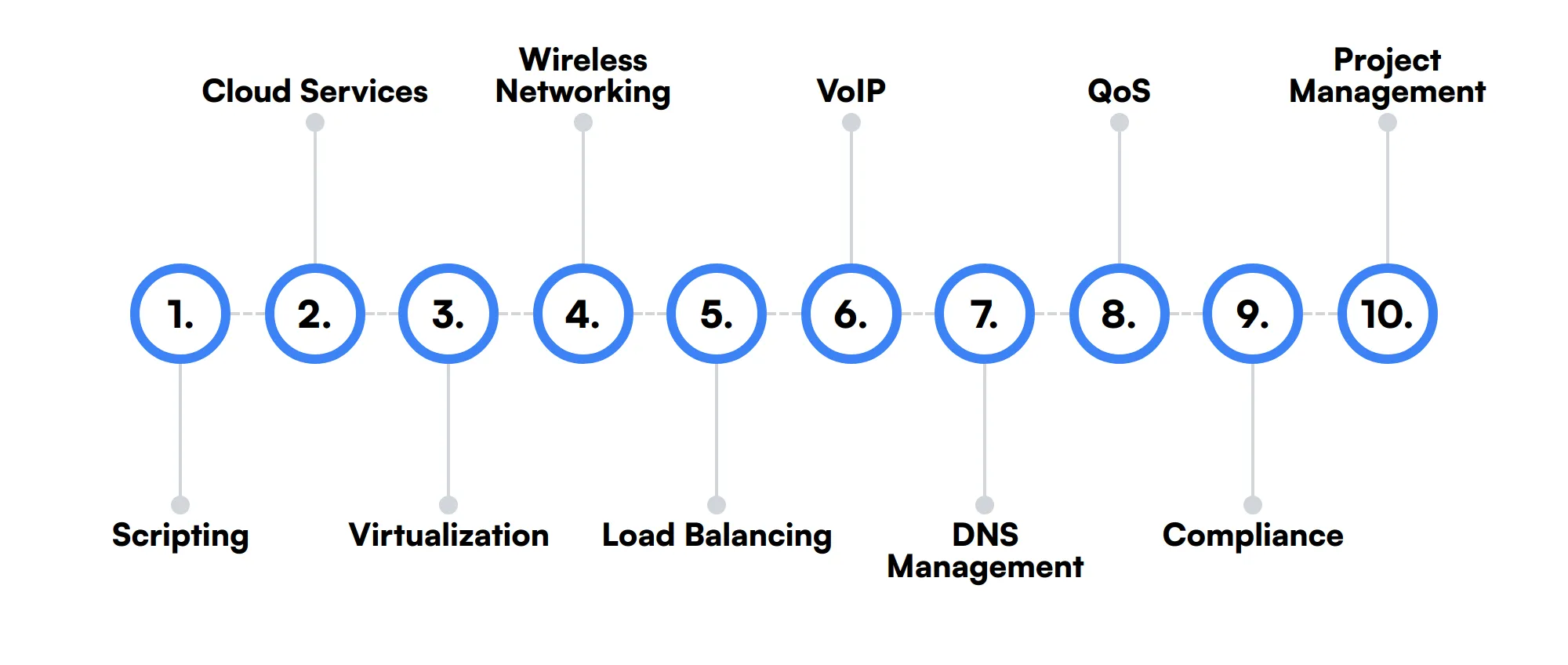
Scripting
Knowledge of scripting languages like Python or Bash can automate repetitive tasks, making network management more efficient.
Cloud Services
Familiarity with cloud platforms like AWS, Azure, or Google Cloud is increasingly important as organizations migrate to cloud-based solutions.
Virtualization
Understanding virtualization technologies such as VMware or Hyper-V helps in managing virtual networks and optimizing resource usage.
Wireless Networking
Skills in setting up and managing wireless networks are essential, especially in environments with a high number of mobile devices.
Load Balancing
Implementing load balancing solutions ensures that network traffic is distributed evenly, preventing overloads and improving performance.
VoIP
Knowledge of Voice over IP (VoIP) systems is useful for managing and troubleshooting internet-based telephony services.
DNS Management
Managing Domain Name System (DNS) settings is crucial for ensuring that domain names resolve correctly to their respective IP addresses.
QoS
Quality of Service (QoS) skills help in prioritizing network traffic to ensure that critical applications receive the necessary bandwidth.
Compliance
Understanding regulatory requirements and ensuring that the network complies with industry standards is important for legal and operational reasons.
Project Management
Basic project management skills help in planning and executing network upgrades, migrations, and other significant changes.
How to assess Network Administrator skills and traits
Assessing the skills and traits of a Network Administrator can be a challenging task. It's not just about knowing the technical aspects but also understanding how they handle real-world scenarios. From network configuration and troubleshooting to security management and vendor coordination, a Network Administrator's role is multifaceted.
Traditional resumes might list qualifications and experience, but they often fall short in revealing a candidate's true capabilities. Skills-based hiring practices, such as talent assessments, provide a more accurate picture of a candidate's proficiency. Adaface assessments can help you achieve 2x improved quality of hires by focusing on real-world skills and scenarios.
When assessing Network Administrators, it's important to evaluate their expertise in key areas like IP addressing, performance monitoring, and backup and recovery. Additionally, their ability to document processes and manage vendor relationships is equally important. By using comprehensive assessments, you can ensure that your candidates are well-rounded and ready to tackle the challenges of the role.
Let’s look at how to assess Network Administrator skills with these 6 talent assessments.
CISCO Routing Switching Test
The CISCO Routing Switching Test evaluates a candidate's proficiency in configuring and managing Cisco routers and switches. It covers essential networking concepts and Cisco-specific technologies.
The test assesses knowledge in routing protocols like OSPF and BGP, switching technologies such as VLANs and STP, and network security. Candidates are also evaluated on their ability to troubleshoot Cisco devices and manage networks using CLI and SNMP.
Successful candidates demonstrate a strong understanding of IP addressing and subnetting, WAN technologies, and Quality of Service (QoS). They can effectively configure and troubleshoot Cisco networking devices.
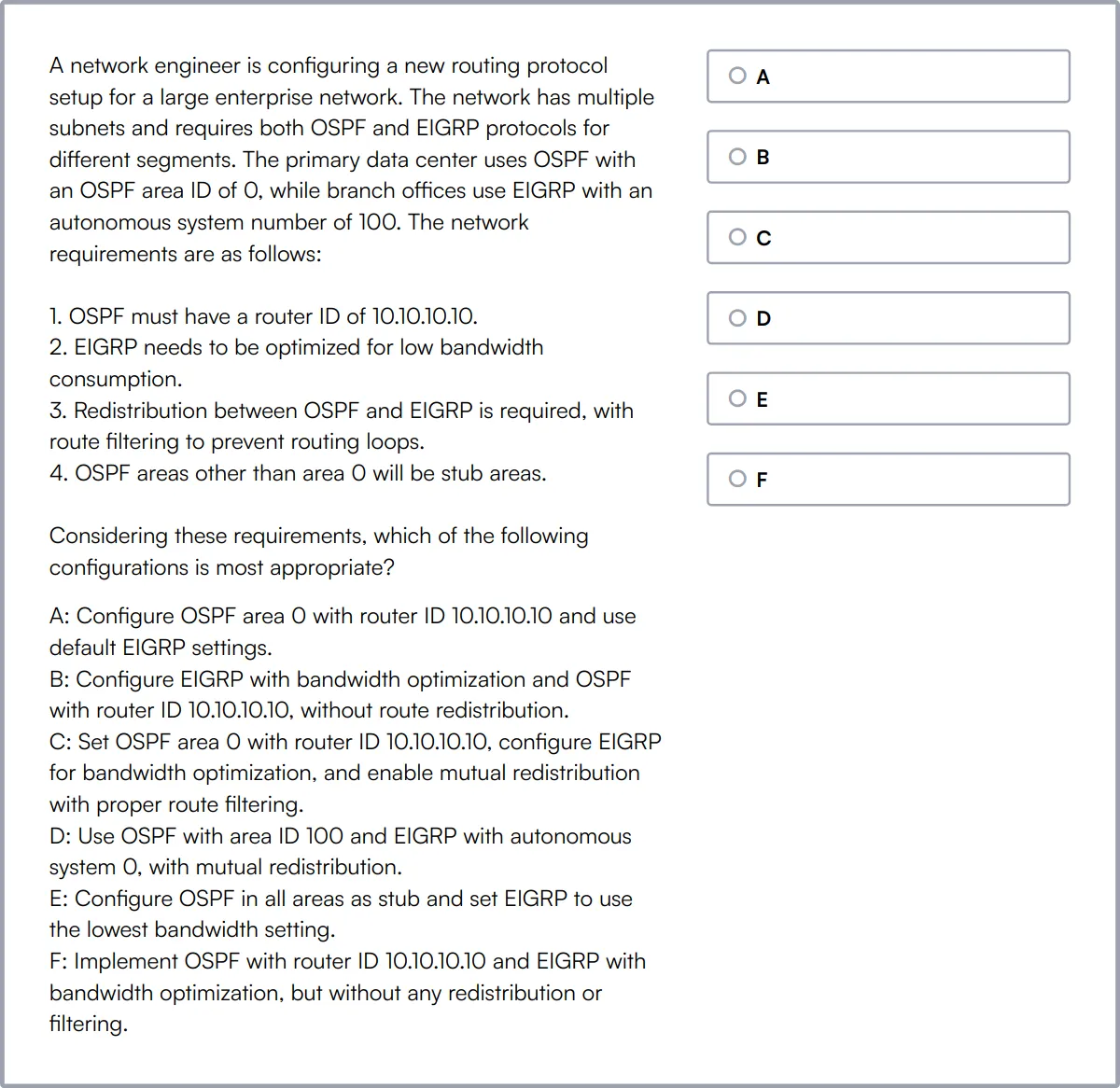
Technical Support Test
The Technical Support Test assesses a candidate's ability to handle IT infrastructure and provide technical support. It covers a broad range of topics from operating systems to customer service skills.
The test evaluates understanding of networking concepts, IT service protocols, and database management. It also includes sections on scripting languages like Python and Bash, and cybersecurity principles.
Candidates are tested on their problem-solving and critical thinking abilities through situational judgement questions. High scorers show proficiency in incident reporting, data backup, and VPN management.
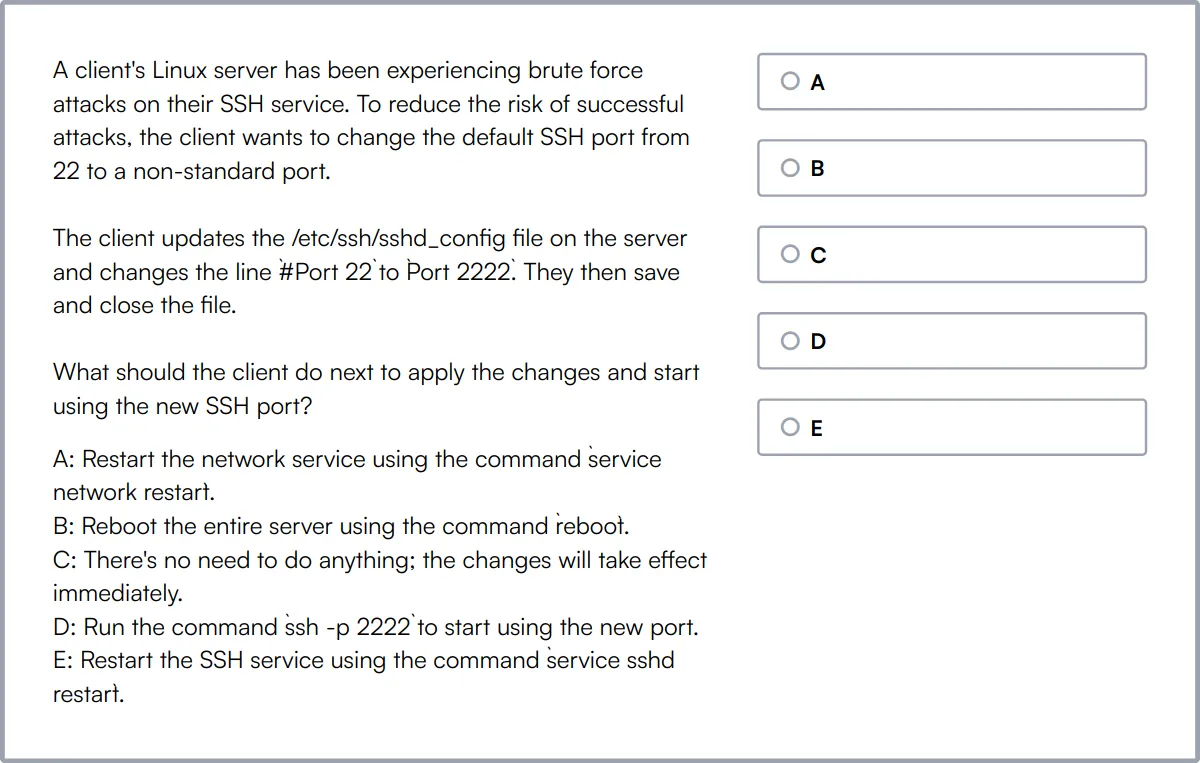
Cyber Security Assessment Test
The Cyber Security Assessment Test evaluates a candidate's knowledge of cybersecurity fundamentals and their ability to detect and mitigate security threats.
The test covers network security protocols, cybersecurity attacks like DoS and man-in-the-middle, and cryptography techniques. It also assesses knowledge in web security, email security, and malware.
Candidates are evaluated on their ability to perform risk assessments, conduct penetration tests, and implement cybersecurity defenses. High scorers demonstrate strong skills in data security and data governance.
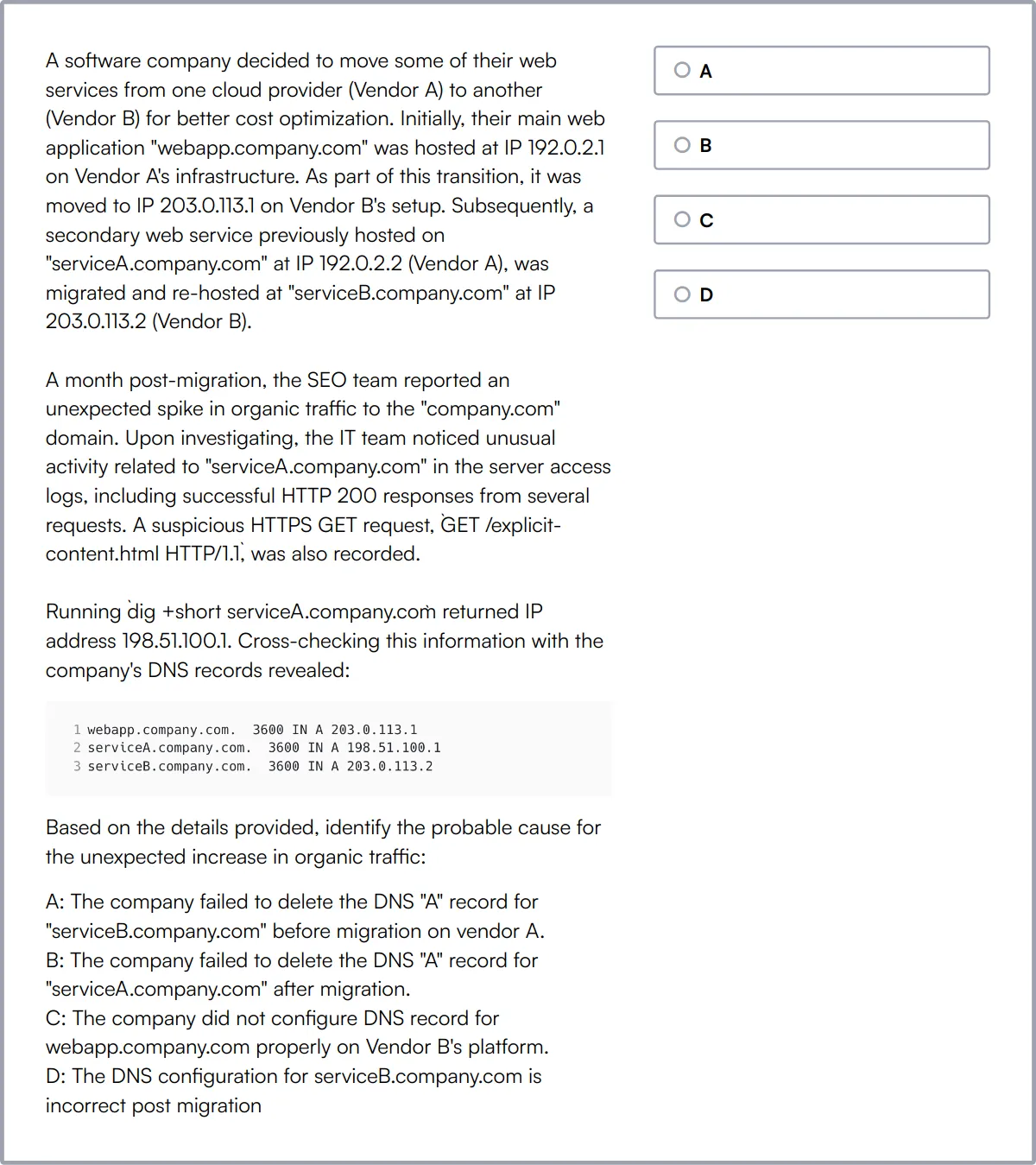
Network Engineer Online Test
The Network Engineer Online Test assesses a candidate's technical knowledge and practical skills in computer networking. It covers a wide range of topics essential for network engineering roles.
The test evaluates understanding of network protocols, routing and switching, and network security. It also includes questions on network troubleshooting, wireless networking, and network design.
Candidates are tested on their ability to optimize network performance and manage LAN/WAN environments. High scorers show proficiency in TCP/IP and network management.
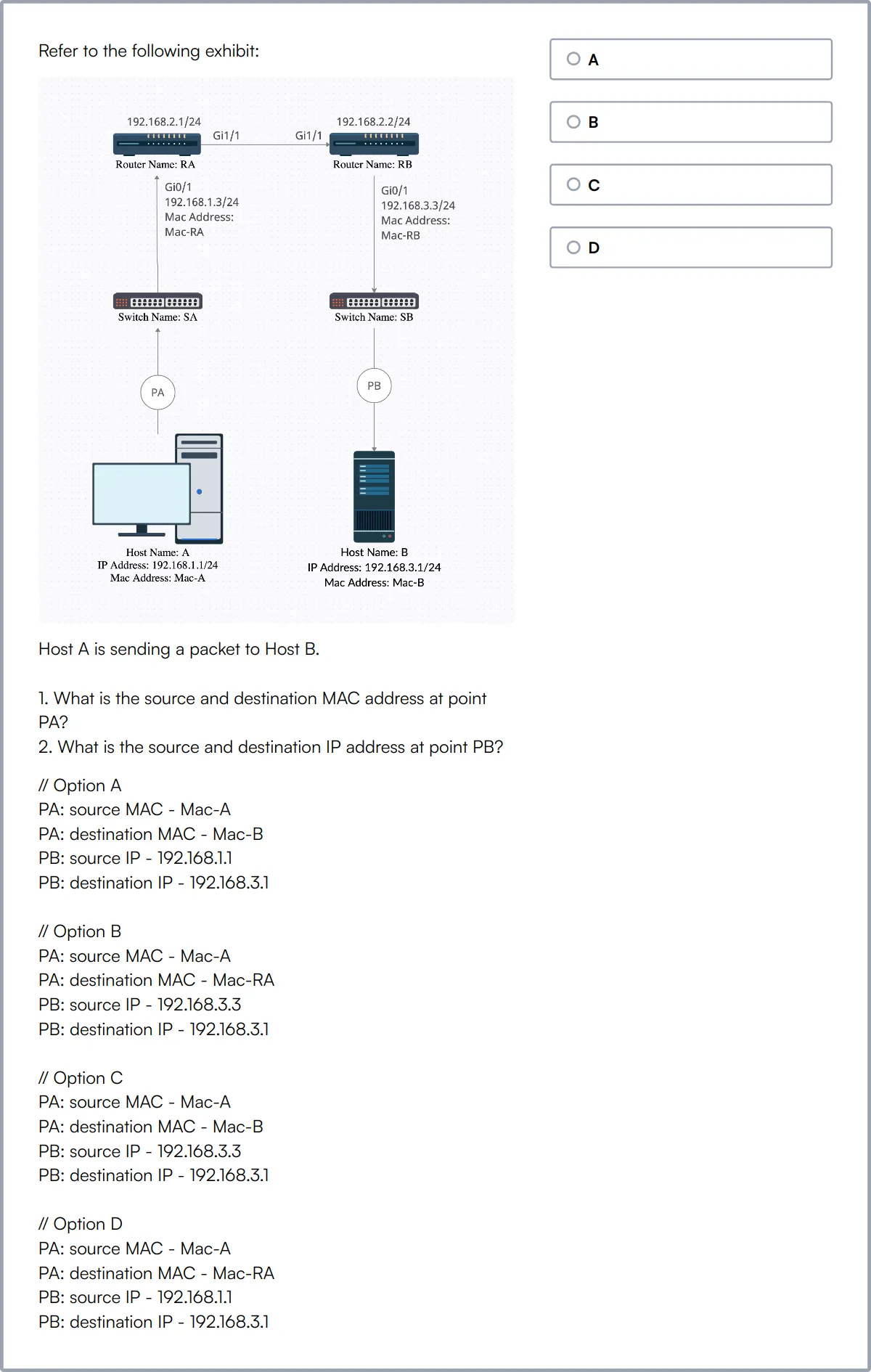
Windows System Administration Online Test
The Windows System Administration Online Test evaluates a candidate's understanding of core Windows system administration concepts. It covers topics like Active Directory and group policy management.
The test assesses knowledge in Windows Server, networking, and PowerShell scripting. It also evaluates the candidate's ability to manage server security and network security.
Candidates are tested on their skills in system monitoring, server virtualization, and disaster recovery. High scorers demonstrate strong proficiency in managing Windows-based enterprise environments.
Project Management Test
The Project Management Test assesses a candidate's ability to plan and execute projects from start to finish. It covers essential project management skills and methodologies.
The test evaluates understanding of cost and budget estimation, project planning, and stakeholder management. It also includes questions on agile project management, Scrum, and traditional waterfall methodologies.
Candidates are tested on their ability to prioritize tasks, resolve issues, and handle changes. High scorers demonstrate strong skills in risk analysis and resource management.
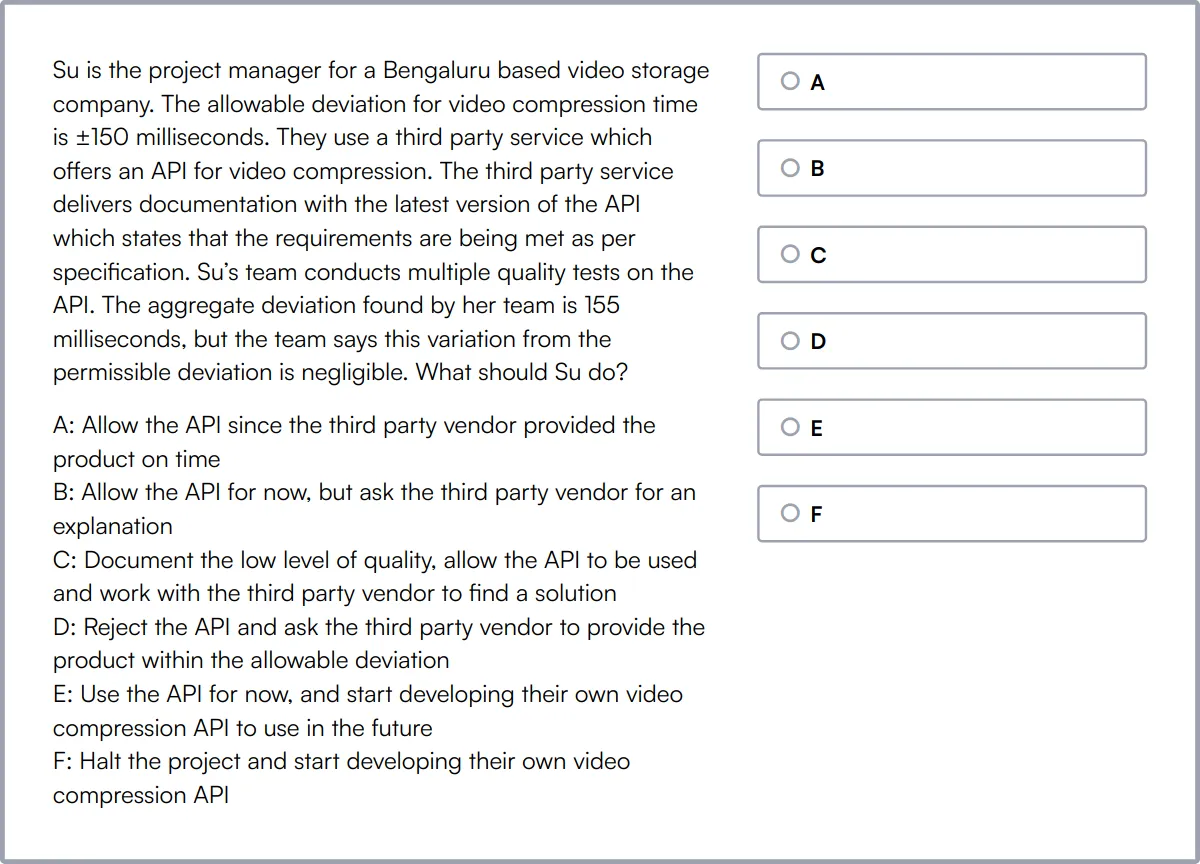
Summary: The 8 key Network Administrator skills and how to test for them
| Network Administrator skill | How to assess them |
|---|---|
| 1. Network Configuration | Evaluate ability to configure routers, switches, and other network devices. |
| 2. Troubleshooting | Assess problem-solving skills in identifying and resolving network issues. |
| 3. Security Management | Check knowledge of firewalls, VPNs, and network security protocols. |
| 4. IP Addressing | Test understanding of IPv4/IPv6 allocation, subnetting, and routing. |
| 5. Performance Monitoring | Review proficiency in using tools to monitor network performance. |
| 6. Backup and Recovery | Verify capability to implement and manage backup and recovery procedures. |
| 7. Vendor Management | Assess skills in negotiating and managing vendor contracts and relationships. |
| 8. Documentation | Evaluate ability to create detailed network documentation and diagrams. |
Network Engineer Online Test
Network Administrator skills FAQs
What skills are necessary for effective network configuration in a Network Administrator role?
Network configuration requires understanding of network topologies, protocols, and device configurations. Administrators should be adept at configuring routers, switches, and firewalls to ensure efficient network operations.
How can troubleshooting skills be assessed during the hiring process for a Network Administrator?
Assess troubleshooting skills by presenting candidates with common network issues and asking them to outline their approach to resolving them. Scenario-based questions can reveal their problem-solving abilities and familiarity with diagnostic tools.
What are the key aspects of security management a Network Administrator must handle?
Security management involves setting up firewalls, intrusion detection systems, and encryption protocols. Administrators must also conduct regular security audits and updates to protect against potential threats.
Why is knowledge of IP addressing important for Network Administrators?
IP addressing is critical for network design and troubleshooting. Network Administrators must understand subnetting, address allocation, and routing protocols to ensure reliable network communication.
How does performance monitoring contribute to network reliability?
Performance monitoring helps in identifying and resolving network bottlenecks and failures. By analyzing traffic and usage patterns, administrators can optimize the network for better performance and uptime.
What should Network Administrators know about backup and recovery?
Administrators should implement regular backup schedules and disaster recovery plans to protect data integrity and availability. Knowledge of backup technologies and recovery procedures is essential for data restoration after incidents.
How important is vendor management for Network Administrators?
Vendor management is key for negotiating service agreements and managing relationships with technology providers. Effective communication and negotiation skills can lead to better service and cost savings.
What role does documentation play in network administration?
Documentation is critical for maintaining consistent network operations. It involves creating and updating network diagrams, configuration details, and procedural guidelines, which are essential for troubleshooting and training.

40 min skill tests.
No trick questions.
Accurate shortlisting.
We make it easy for you to find the best candidates in your pipeline with a 40 min skills test.
Try for freeRelated posts
Free resources



